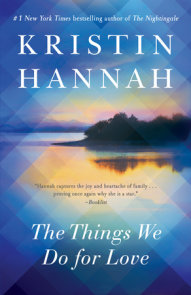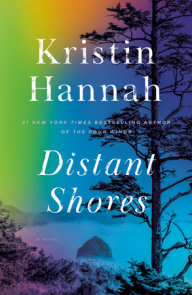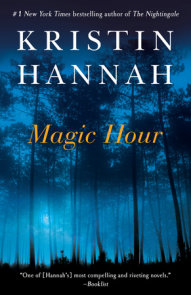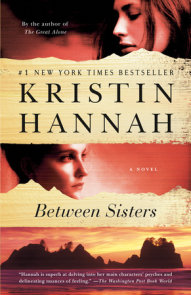READERS GUIDE
Home Again by Kristin HannahA Conversation with Kristin Hannah and Random House Reader’s Circle
Random House Reader’s Circle: What inspired you to write Home Again?
Kristin Hannah: Home Again was inspired by a real-life event. I was watching television one day—a talk show—and the guest was a man who had recently had a heart transplant. This was remark- able enough, but as the interview went on, and the story unfolded, I listened in awe as this man related the story of his transplant. He had been on his deathbed and his daughter had been in a terrible motorcycle accident on the way to saying her final good-bye. He then had to make the wonderful/terrible decision to accept his daughter’s heart. I don’t think anyone could hear this extraordinary story and not be moved. I knew immediately that I had the inspira- tion for my next novel.
RHRC: Home Again is different from your other books in that there’s a supernatural element to the story. Was this always something you planned to include in the plot or did it happen organically as you were writing?
KH: Actually, early on in my career I included supernatural elements into my novels on a fairly regular basis. I touched on reincarnation, “going into the light,” and time travel. The supernatural element in this book arose very naturally from the subject matter. For me, heart transplantation led inexorably to questions of spirituality. Anyone who has read my body of work knows that I am endlessly fascinated with life-and-death issues, and this novel is really an extension of that interest.
RHRC: Madelaine’s a cardiologist, Francis is a priest, and Angel is an actor. In all your novels, your characters have interesting and varied careers. How do you choose the careers of your characters? What is the process of creating a character like for you?
KH: One of the things I love most about writing is the research into people’s lives. I love to learn about other careers and how people live. As far as choosing the careers of my characters, it’s really a question of fitting all the pieces together. Each of the various com- ponents of a character’s life—his or her backstory, career, educa- tion, hobbies, family relationships, and self-image—has to serve the issue or theme that I’ve set as the foundation of the story. That’s really what it’s all about for me: an exploration of a theme.
RHRC: You’ve written a few books that have a teenager’s perspective; is there a particular reason why you chose to include a teen viewpoint in many of your works?
KH: I think it’s because the teen years are so pivotal in our lives. In our youth, we are often faced with difficult, potentially life-altering decisions, yet we don’t have the experience to handle it all with grace. We stumble and fall and learn to stand on our own. I am particularly drawn to the intense pressure that our teens are under these days.
RHRC: Do you ever draw from your own life for your stories or your characters?
KH: I don’t write autobiographical pieces per se, but I am constantly drawing from my own life and my own experiences.
RHRC: What was the biggest challenge you faced while writing Home Again?
KH: There were several challenges in writing Home Again. First off, it was my first contemporary novel, so I had to nurture and develop a different voice. It was in finding that voice that I glimpsed the future of my career. Once I began writing about modern women, I was hooked. The other challenge of the novel was the research. It was really important to me that the novel be as accurate as I could make it about this important topic.
RHRC: At the core of your stories, there is always a message, often related to mothers and daughters, husbands and wives, sisters. What is the message that you’d like readers to take from this book?
KH: I never set out to impart a “message” in a novel. Really, I just intend to tell a powerful, emotional, universal story. That being said, I do find that my work as a whole contains definite thematic similarities. It’s obvious that I believe in forgiveness, redemption, second chances, and the power of love to transform our lives. Each of those themes is definitely present in Home Again. I also really believe in the triumph of the human spirit to overcome adversity.
RHRC: Francis is a priest who is confronting regrets about the path he has taken in life. Why did you include this character in this story? Was it hard to get into the mind of a priest?
KH: No, it wasn’t any more difficult to write a priest than to write any other character. It required the same combination of research and imagination that most characterizations require. I chose a priest because of the questions of spirituality raised by the issue of heart transplantation. Obviously, the heart is a physical part of our bodies, but culturally, it represents so much more. I needed a character whose spirituality was so profound that it could be nearly transcendent.
Questions and Topics for Discussion
1. Seventeen-year-old Angel betrays Madelaine by taking money from her father in exchange for ending their relationship. Why do you think he chose to do this? Do you understand his deci- sion? Do you believe that a thing like this can or should be for- given? Do you think he would have made the same choice had he known that she was going to have the baby?
2. When Angel hears that he needs a heart transplant, he is both troubled and torn by the thought of having someone else’s heart in his body. This is actually a common reaction. How do you think you would feel in that situation?
3. Do you think a person has a right to know about his or her organ donor, or is it better if confidentiality is maintained? Why or why not?
4. Should Madelaine have revealed Lina’s father to her earlier? Is there an appropriate moment or age to have this kind of discussion with your child?
5. Francis and Angel were treated differently by their mother. How do you think this affected each man?
6. Madelaine tries so hard to be Lina’s friend that she sometimes fails as a parent. In what instances do you believe Madelaine is a bad parent? When is she a good parent?
7. There is some scientific evidence that states that organs may hold memories on a cellular level. Do you believe that’s possible? If so, do you believe that these memories can be trans- ferred to the recipient? How does that possibility affect your opinion on organ donation?
8. Would Madelaine have told Angel about his donor if the media weren’t involved? Do you think she should have kept it a secret?
9. Francis faces regrets about his life; do you believe that priesthood was truly his calling? How do you feel about his conflicted feelings between his love for his God and his faith and his longing for what could have been?
10. Lina is an angry and confused young girl who wants her mother’s love yet rejects it. Why do you think it’s so hard for chil- dren to express their feelings to their parents?
11. Madelaine grew up with a stern, rigid father, while Lina grew up with no father at all. How did this impact their lives and their characters?
12. Imagine these characters in five years. In ten. What do you think their lives will be like?





















